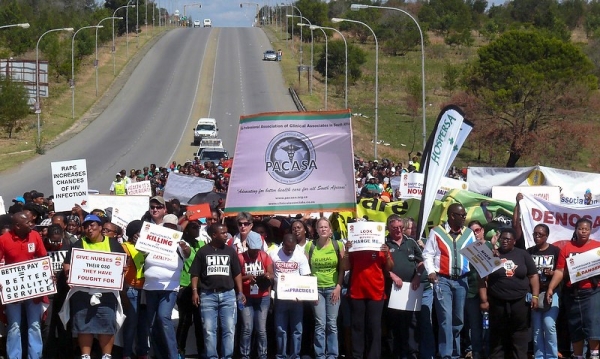Government job freeze alarms health professionals

No vacant posts in Eastern Cape public hospitals and clinics are to be filled until December, according to a departmental circular. The Rural Health Advocacy Project fears that if such measures continue it could have “catastrophic consequences for health care”, especially in the rural areas.
A circular from the Office of the DDG Human Resource and Corporate Services, Eastern Cape Health Department from September states that the freezing of vacant posts is a “drastic measure” caused by the “poor financial position of the department”. Non-clinical posts (which have been frozen since June) and clinical posts, as well as posts filled through conditional grants, may not be filled until December 2015.
In situations where the selection process is incomplete and appointment letters are still to be issued, “the process has to be abandoned” states the letter, addressed to deputy directors general, chief directors, district managers, chief executive officers and heads of institutions.
A provincial central committee is to be established to deal with critical posts.

Screenshot of the Eastern Cape Health Department website that last advertised vacancies online in September.
Sizwe Kupelo, media liaison for Eastern Cape Health Department, in an emailed response said the measure “does not affect service delivery”. He denied that there was a “total ban on vacancies”.
But Noloyiso Ntamehlo from the TAC said that the freezing of posts was already affecting patient care in the Eastern Cape. She said there were fewer visits by doctors to rural clinics.
“Nurses are doing all the work doctors are supposed to do,” she said. There was a shortage not only of health professionals but also of positions such as data capturers, she said.
The reason given for the freezing of posts in the circular is that the earlier moratorium in June on non-clinical posts had not produced a reduction in staff costs.
The freeze is in line with statements in the “mini-budget” tabled in Parliament last month, that the government’s revised three-year spending plan “provides no funds to expand public-sector employment over the next three years”.
“Departments that had planned to expand headcount or fill vacancies need to postpone their plans. Some institutions may need to reduce the number of people they employ,” the statement said, opening the way to job losses in the public sector.
The Rural Health Advocacy Project has warned of serious problems if staffing levels cannot be maintained. In a submission on the mini-budget, RHAP warned of “diminished capacity to deliver services; poor supervision of existing staff; weakened support processes (e.g. procurement); additional strain being put on already overburdened staff; and consequently, overburdened staff leaving the public service, deepening the crisis.”
RHAP recommended that decisions on cost cutting should be made at district level, and that the National Department of Health and the National Treasury should provide guidance on how provinces should protect critical posts.
Marije Versteeg-Mojanaga, director of RHAP, said better solutions had to be found to budget deficits. Critical posts had been frozen or, in one understaffed Eastern Cape hospital, simply abolished, “depriving a large poor rural community of access to health care”.
Sasha Stevenson, an attorney from SECTION27, told GroundUp that SECTION27 was investigating the impact of the freeze in the Eastern Cape and North West Province. She said the nationally negotiated 10,1% salary increase for all government employees had not been reflected in the budget and money for the increase would have to come from elsewhere.
“A moratorium on hiring, even where someone has just left and a post has just become vacant, means that health departments haemorrhage human resources,” she said.
The lack of clarity on the definition of a “critical position”, she said, left health managers in a difficult situation.
“In certain circumstances in a hospital, a cleaner is a critical position, or a nurse or a doctor.”
Stevenson said there was a risk that rural hospitals and clinics would lose staff to the towns or to private health care.This would have serious long-term consequences, she said.
North West Province and KwaZulu-Natal have both frozen vacant posts, with the North West’s moratorium affecting all departments, not just the department of health.
In April this year, three North West Province departments, including the department of health, were placed under joint administration by the National Treasury, because of financial mismanagement.
Versteeg-Mojanaga, from RHAP, said freezing of posts and budget cuts led to burnout, low staff morale and staff moonlighting in the private sector. She said in some provinces, such as Mpumalanga, the shedding of posts to bring down the vacancy rate was recommended in strategic plans. This meant that there was no longer a need to fill the post as it was not technically vacant. In the Western Cape, there was an “approved list” of posts which could be filled.
Instead of all this, she said, there should be a plan based on evidence of which posts should be filled.
“We cannot have a blanket freeze on posts,” she said.
Support independent journalism
Donate using Payfast

Don't miss out on the latest news
We respect your privacy, and promise we won't spam you.
Next: Students throw water bottles at vice-chancellor
Previous: Zakhele Mbhele of the DA replies to R2K’s Murray Hunter

This article is licensed under a Creative Commons Attribution-NoDerivatives 4.0 International License.
